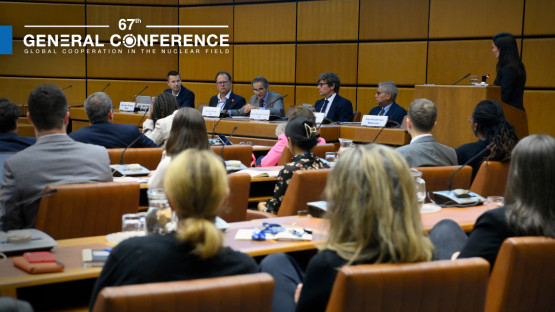On Day 4 of the IAEA General Conference, 11 countries were newly elected to serve on the 35-member IAEA Board of Governors for the 2023–2024 period.
67th IAEA General Conference: Day 4 Highlights
At the event on the Global Water Analysis Laboratory (GloWAL) Network, participants learned how GloWAL empowers countries to generate their own chemical, biological and isotopic water data. (Photo: D. Calma/IAEA)
The following side events took place on Thursday:
The Robotized Cherenkov Viewing Device (RCVD), which is a floating autonomous robotic platform, was presented during the RCVD Technical Demonstration. The RCVD offers unprecedented gains in efficiency and data quality for spent nuclear fuel verification. “With the support of a number of Member State Support Programmes, the RCVD is set to become a more efficient way to perform the verification of nuclear material stored in spent nuclear fuel ponds,” said Lia Meirose, Associate Instrumentation Engineer at the IAEA. “I was excited to share a first-hand look at this cutting-edge robot, designed specifically for the needs of IAEA safeguards.”
Several countries have used the Regulatory Authority Information System (RAIS) to establish their registries of radiation sources and other safety and nuclear security related records. The Launch of the RAIS+ event presented a new version of the system, which was developed based on feedback and new information technologies.
The event on Global Water Analysis Laboratory (GloWAL) Network explained how countries can get involved with the GloWAL Network and the benefits they can derive from being a member. The GloWAL Network empowers countries to generate their own chemical, biological and isotopic water data. The network was launched at the UN Water Conference in 2023.
The Artificial Intelligence (AI) and the IAEA event highlighted the IAEA's crucial role in promoting the understanding of AI in nuclear science. The IAEA leads discussions and partnerships, aiming for safe and secure AI integration, exploring its benefits and addressing its challenges and ethical concerns.
Member States’ side events:
The promises of fuel cycle closure, enhanced safety and economic competitiveness are attracting attention to lead cooled fast reactors (LFRs). The Advancement of LFR Technology: A Global Overview event, organized by Italy, provided an overview of ongoing worldwide activities on the development of LFR technology, as well as perspectives on its deployment.
Other activities:
At the Senior Safety and Security Regulators’ Meeting, regulatory officials talked about challenges and best practices in areas like nuclear safety and waste management. The meeting covered ways the IAEA supports regulatory bodies.
A panel of international experts from ongoing or recently completed nuclear power plant construction projects presented at the Operator’s Forum on Nuclear Power Plant Construction: New Technologies, Good Practices and Recent Achievements. The experts shared experiences and how acquired capability can be leveraged to deliver projects in the future, including the construction of small modular reactors and other advanced nuclear power designs.
The African Regional Co-operative Agreement for Research, Development and Training Related to Nuclear Science and Technology (AFRA) is an agreement to strengthen and enlarge the contribution of nuclear science and technology to socioeconomic development on the African continent. At the 34th Meeting of the AFRA, representatives discussed the 2022 AFRA Annual Report and endorsed the recommendations of the AFRA Technical Working Group.
At the National Liaison Officers Meeting for Member States from Europe and Central Asia Participating in Technical Cooperation Programme, officers engaged in comprehensive dialogue concerning the implementation and plans related to IAEA technical cooperation programme.
The synergies between the Convention on the Physical Protection of Nuclear Material and its Amendment (A/CPPNM) and the International Convention for the Suppression of Acts of Nuclear Terrorism (ICSANT) in strengthening nuclear security globally were discussed at the side event on Strengthening Nuclear Security Worldwide Through the A/CPPNM and ICSANT. The event was jointly organized by the IAEA and the United Nations Office on Drugs and Crime (UNODC) as part of their efforts to promote the universalization and effective implementation of the A/CPPNM and ICSANT.







